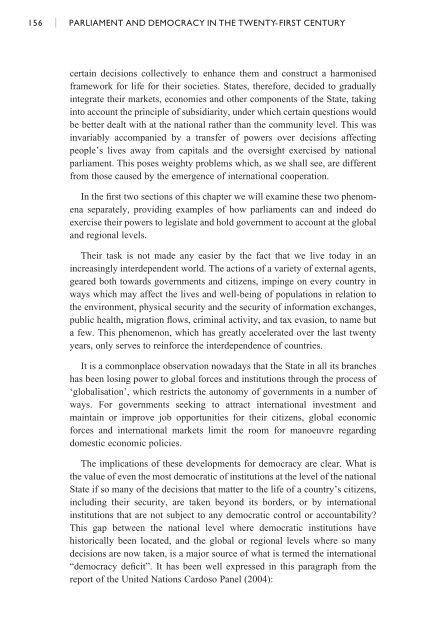PARLIAMENT AND DEMOCRACY - Inter-Parliamentary Union
PARLIAMENT AND DEMOCRACY - Inter-Parliamentary Union
PARLIAMENT AND DEMOCRACY - Inter-Parliamentary Union
You also want an ePaper? Increase the reach of your titles
YUMPU automatically turns print PDFs into web optimized ePapers that Google loves.
156 I <strong>PARLIAMENT</strong> <strong>AND</strong> <strong>DEMOCRACY</strong> IN THE TWENTY-FIRST CENTURY<br />
certain decisions collectively to enhance them and construct a harmonised<br />
framework for life for their societies. States, therefore, decided to gradually<br />
integrate their markets, economies and other components of the State, taking<br />
into account the principle of subsidiarity, under which certain questions would<br />
be better dealt with at the national rather than the community level. This was<br />
invariably accompanied by a transfer of powers over decisions affecting<br />
people’s lives away from capitals and the oversight exercised by national<br />
parliament. This poses weighty problems which, as we shall see, are different<br />
from those caused by the emergence of international cooperation.<br />
In the first two sections of this chapter we will examine these two phenomena<br />
separately, providing examples of how parliaments can and indeed do<br />
exercise their powers to legislate and hold government to account at the global<br />
and regional levels.<br />
Their task is not made any easier by the fact that we live today in an<br />
increasingly interdependent world. The actions of a variety of external agents,<br />
geared both towards governments and citizens, impinge on every country in<br />
ways which may affect the lives and well-being of populations in relation to<br />
the environment, physical security and the security of information exchanges,<br />
public health, migration flows, criminal activity, and tax evasion, to name but<br />
a few. This phenomenon, which has greatly accelerated over the last twenty<br />
years, only serves to reinforce the interdependence of countries.<br />
It is a commonplace observation nowadays that the State in all its branches<br />
has been losing power to global forces and institutions through the process of<br />
‘globalisation’, which restricts the autonomy of governments in a number of<br />
ways. For governments seeking to attract international investment and<br />
maintain or improve job opportunities for their citizens, global economic<br />
forces and international markets limit the room for manoeuvre regarding<br />
domestic economic policies.<br />
The implications of these developments for democracy are clear. What is<br />
the value of even the most democratic of institutions at the level of the national<br />
State if so many of the decisions that matter to the life of a country’s citizens,<br />
including their security, are taken beyond its borders, or by international<br />
institutions that are not subject to any democratic control or accountability?<br />
This gap between the national level where democratic institutions have<br />
historically been located, and the global or regional levels where so many<br />
decisions are now taken, is a major source of what is termed the international<br />
“democracy deficit”. It has been well expressed in this paragraph from the<br />
report of the United Nations Cardoso Panel (2004):

















